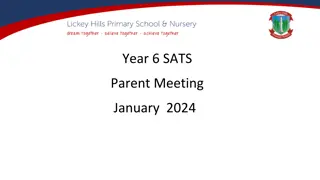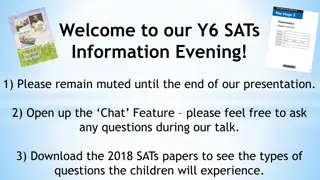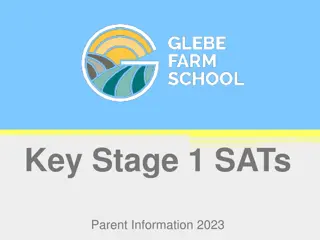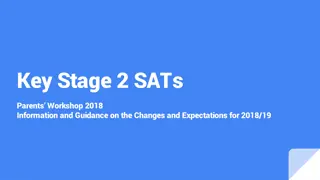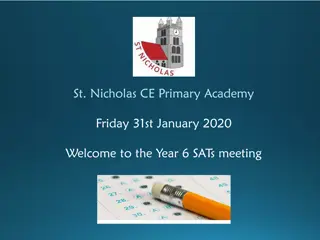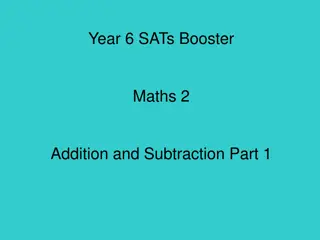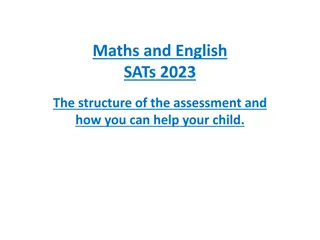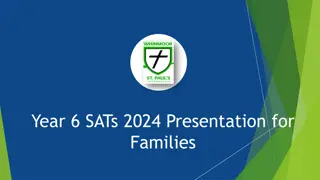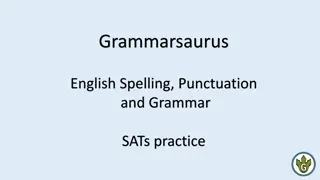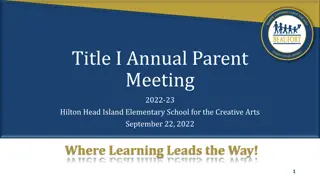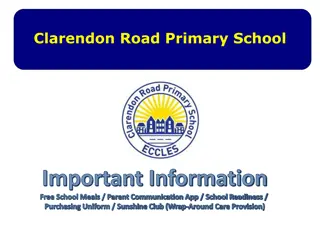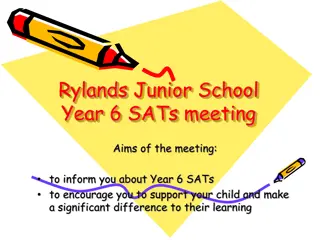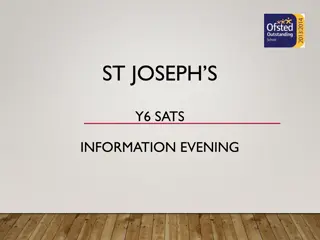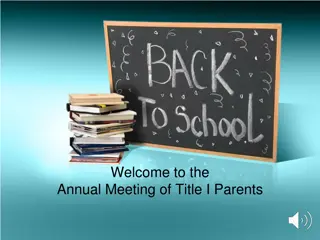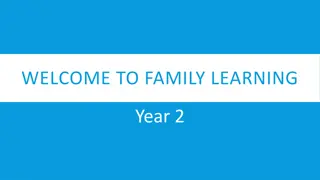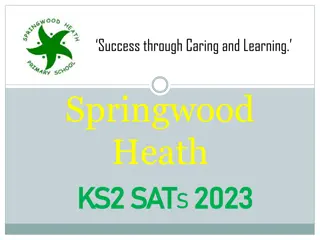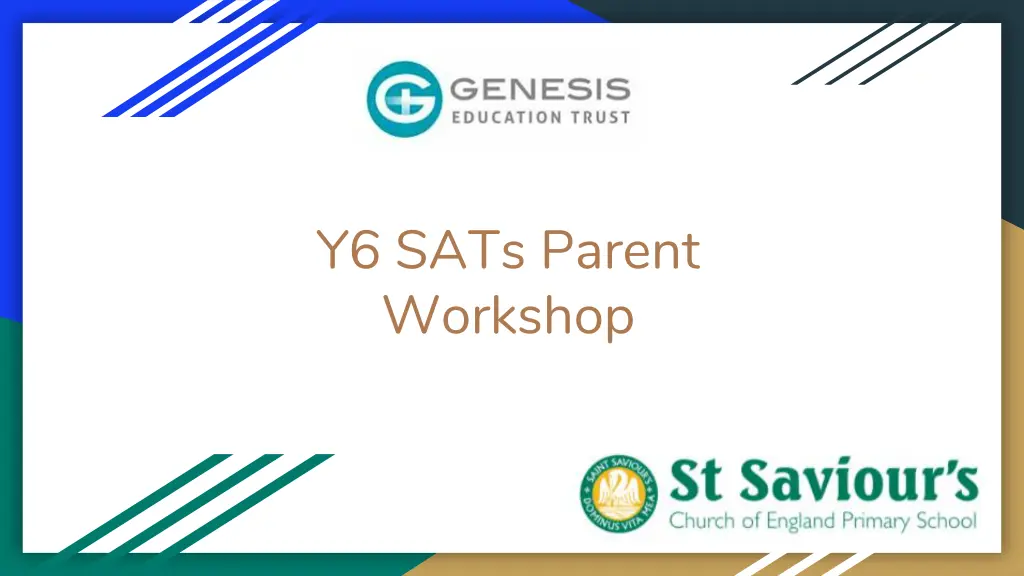
Understanding Year 6 SATs Assessment
Year 6 SATs are Standardised Assessment Tests taken by children at the end of Key Stage 2. These tests cover Spelling, Punctuation, Grammar, Reading, and Maths and are important for secondary school placement. The assessments are held under exam conditions over four days in May, and results are externally marked with scaled scores. Learn more about the structure, importance, and delivery of Year 6 SATs.
Uploaded on | 0 Views
Download Presentation

Please find below an Image/Link to download the presentation.
The content on the website is provided AS IS for your information and personal use only. It may not be sold, licensed, or shared on other websites without obtaining consent from the author. If you encounter any issues during the download, it is possible that the publisher has removed the file from their server.
You are allowed to download the files provided on this website for personal or commercial use, subject to the condition that they are used lawfully. All files are the property of their respective owners.
The content on the website is provided AS IS for your information and personal use only. It may not be sold, licensed, or shared on other websites without obtaining consent from the author.
E N D
Presentation Transcript
Y6 SATs Parent Workshop
What are the Sats? SATs are the Standardised Assessment Tests that are given to children at the end of Key Stage 2. The SATs take place over four days, starting on Monday 9thMay ending on Thursday 12thMay. The SATs papers consist of: Spelling, punctuation and grammar 9thMay Reading Tuesday 10thMay Maths (paper 1: Arithmetic) Wednesday 11thMay Maths (paper 2: Reasoning) Wednesday 11thMay Maths (paper 3: Reasoning) Thursday 12thMay
Why are they important? Most secondary schools look at Year 6 SATs results as part of the decision process when grouping students into sets or streams. SATs results will help your child's secondary school to put them in the right set to ensure that they get the most from their time there.
When are they? How do we deliver them? The tests take place during normal school hours, under exam conditions. Children are not allowed to talk to each other from the moment the assessments are handed out until they are collected at the end of the test. After the tests are completed, the papers are send away to be marked externally. The results are than sent to the school in July. Each test lasts no longer than 60minutes: Grammar, punctuation and spelling (Paper 1) 45min Grammar, punctuation and spelling (Paper 2) 15min Maths Paper 1 (Arithmetic) 30min Maths Paper 2 (Reasoning) 40min Maths Paper 3 (Reasoning) 40min Reading 60min
Results Test are marked externally Once marked, the tests will be given the following scores: A raw score (total number of marks achieved for each paper); A scaled score (see below); A judgement on if the National Standard has been met. Results are sent to the school in July. Scaled scores range from 80 to 120. A scaled score of 100 or more shows the pupil is meeting the National Standard.
Spelling, Punctuation and Grammar: Monday 9thMay Test are marked externally The children will have been working hard with their class teacher on developing and securing their knowledge of the technical vocabulary needed in this test. Once marked, the tests will be given the following scores: A raw score (total number of marks achieved for each paper); A scaled score (see below); A judgement on if the National Standard has been met. This test focuses on: Grammatical terms/ word classes; Functions of sentences; Combining words, phrases and clauses; Verb forms, tenses and consistency; Punctuation; Vocabulary; Standard English and formality. Results are sent to the school in July. Scaled scores range from 80 to 120. A scaled score of 100 or more shows the pupil is meeting the National Standard.
Paper 2 consist of a spelling test only. It should take approximately 15 minutes although this is not a set amount of time (pupils should be given as much time as they need to complete the test.
Reading: Tuesday 10thMay There is one reading test that lasts for 60 minutes. The test is designed to measure if the children s comprehension of age-appropriate reading material meets the national standard. There are three different set texts for children to read. These could be any combination of non-fiction, fiction and/ or poetry. The test covers the following areas (known as Content Domains): Give/ explain the meaning of words in context; Retrieve and record information/ identify key details from fiction and non-fiction; Summarise main ideas from more than one paragraph; Make inferences from the text/ explain and justify inferences with evidence from the text; Predict what might happen from details stated and implied; Identify/ explain how information/ narrative content is related and contributes to meaning as a whole; Identify/ explain how meaning is enhanced through choice of words and phrases; Make comparisons within the text.
The reading SATs paper requires a range of answer styles. Example questions:
Example questions: Based on text 3: Music Box
Since the current testing formation for the SATs began in 2016, there has been a tendency for three types of questions to be the most popular. In the 2019 Reading SATs paper, 12% of marks could be gained from answering questions involving giving and explaining the meaning of words in context; 42% of marks could be gained from answering questions involving retrieving and recording information or identifying key details from a text; 36% of marks could be gained from answering questions involving making inferences from a text and justifying inferences with text evidence. When reading with your child at home try focusing on these types of questions.
Maths: Wednesday 11thMay and Thursday 12thMay The maths assessments consist of three tests. Paper 1: Arithmetic (30 minutes) Wednesday 11th May Paper 2: Reasoning (40 minutes) Wednesday 11th May Paper 3: Reasoning (40 minutes) Thursday 12thMay
Mathematics Paper 1 Example questions (2019) The maths arithmetic paper has a total of 40 marks. . The test covers the four operations (addition, subtraction, multiplication, division, including order of operations requiring BIDMAS), percentages of amounts and calculating with decimals and fractions. Example question:
Mathematics Paper 2 and 3 (Reasoning) Paper 2 will take place on Wednesday 11thMay and paper 3 will take place on Thursday 12thMay. These tests have a total of 35 marks each. These papers require children to demonstrate their mathematical knowledge and skills, as well as their ability to solve problems and their mathematical reasoning. They cover a wide range of mathematical topics from key stage 2 including, Number and place value (including Roman numerals); The four operations; Geometry (properties of shape, position and direction); Statistics; Measurement (length, perimeter, mass, volume, time, money); Algebra; Ratio and proportion; Fractions, decimals and percentages.
Mathematics Paper 2 and 3 Example questions:
Mathematics Paper 2 and 3 Example questions:
Supporting you child in preparation for SATs Firstly, a positive attitude goes a long way. Give them as much encouragement and support as you can. Tips: Give your child a quiet, distraction free space to complete homework or study. Give your child time to go outside and reduce screen time. Ensure your child is eating and drinking well and getting a good amount of sleep. Plan something nice and fun for the weekends before and after SATs. This will help them to relax before the SATs and give them something to look forward to after. Ensure your child attends as many of the free booster sessions they have been invited to as they can: Arithmetic booster before school Maths and Reading booster after school Saturday school - - - Not all children will meet the expected standard or GDS as they all learn and progress at their own pace. We only ask that they work hard and try their best to reach their full potential.


